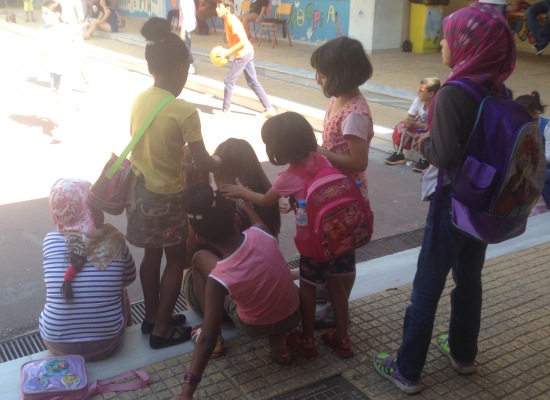
20-07-16 Nilos Filis visits school that teaches refugee children
Education, Research and Religious Affairs Minister Nikos Filis visited Athens’ 51st primary school in the inner city Metaxourgeio district. There, 30 teachers are volunteering their services in the “Schools without Borders” programme at the school, in cooperation with the NGO “Network for Children’s Rights” and the Athens Municipality.
The programme exposes 130 children, residing at the refugee camps of Elliniko, Shisto, and central Athens, to the Greek language and culture, while allowing creative contacts between the children.
The programme, which operates daily from 9 am to 1 pm, prepares children of age 6-12 to enter a Greek school by teaching them Greek and English, offering athletics and recreational activities, and allowing them to socialise.
Nikos Filis visited various classes and spoke with the children as well as the teachers, who are the “soul” of the volunteer effort.
“We came here to learn. This is an experience and precedent we must utilise in preparing for the new school year,” Filis told teachers.
Myrsini Zorba, President of the Network for Children’s Rights, briefed the minister about the programme, noting the importance of the daily meeting in which teachers are able to compare notes in order to improve the educational offering.
“We hope in the end to fashion a programme that will be a compass on how we should treat these children, and how teachers should be trained in seminars,” Zorba said. She also described field trips for the students to the National Archaeological Museum and the Museum of Islamic Art, as well as film screenings and talks with authors of children’s books.
For his part, Minister Filis made the following remarks:
“Perhaps a small group of the thousands of children of the 50,000 refugees residing in our country will need to go to school programmes. There is a wide variety of categories of migrants because this migration current is not like the one in the 1990’s, when the people came to love our country and to contribute to the economic development of Greece. Today, the objectives of people [migrants] are different, as most see Greece as a transit country, and not a place of permanent residence. But the transit period may be a prolonged one, and some will remain in Greece under our international treaty obligations [asylum seekers],” Filis said.
Filis said that ways must be found to make migrant children’s stay in Greece a productive one. He asserted that the key to managing the educational needs of refugee children is finding ways to integrate them into society. The aim, he said, is to avoid a ghettoisation of migrant children.
The minister said the government’s aim over the coming months is to gradually induct the majority of these children in the school system, by creating special reception classes.
Filis extolled the power of voluntarism, “which has at its foundation the embracing of these children with solidarity and love”. But he underlined that the state must also assume its responsibilities, as voluntarism alone cannot meet the needs of the children.
“The open school does not close when classes end, but can also operate in the afternoon in cooperation with local municipalities. It is a model that we should expand nationwide,” Filis said.
The minister noted that 800 substitute teachers trained in teaching Greek as a second language will be hired, and a related call will be issued during this summer.
